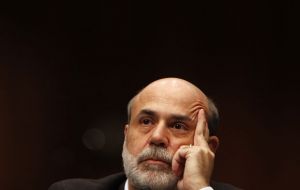MercoPress. South Atlantic News Agency
Federal Reserve Anticipates Exceptionally Low Level Rates for an Extended Period
 Chairman Bernanke, inflation to remain subdued with substantial resource slack
Chairman Bernanke, inflation to remain subdued with substantial resource slack The US Federal Reserve decided on Wednesday to leave interest rates unchanged saying the current recovery will not result in rampant inflation and anticipated exceptionally low level rates for an extended period.
The Federal Open Market Committee (FMOC) kept the target range for its federal funds at between 0 and 0.25% a record low level for the benchmark rate which was first imposed December 2008.
“With substantial resource slack continuing to restrain cost pressures and longer-term inflation expectations stable, inflation is likely to be subdued for some time,” the FOMC said in a press release at the conclusion of two days of meetings.
FOMC added that it continues to anticipate “that economic conditions, including low rates of resource utilization, subdued inflation trends, and stable inflation expectations, are likely to warrant exceptionally low levels of the federal funds rate for an extended period”.
The release also points to an improved functioning of financial markets: the Federal Reserve has closed all but one of the special liquidity facilities that it created to support markets during the crisis. The only remaining such program, the Term Asset-Backed Securities Loan Facility, is scheduled to close on June 30 for loans backed by new-issue commercial mortgage-backed securities; it closed on March 31 for loans backed by all other types of collateral.
The FOMC described the current United States scenario as one where economic activity has continued to strengthen and the labour market is beginning to improve.
However, in spite that “growth in household spending has picked up recently it remains constrained by high unemployment, modest income growth, lower housing wealth, and tight credit. Business spending on equipment and software has risen significantly; but investment in non-residential structures is declining and employers remain reluctant to add to payrolls. Housing starts have edged up but remain at a depressed level. While bank lending continues to contract, financial market conditions remain supportive of economic growth”.
Finally, although “the pace of economic recovery is likely to be moderate for a time, FOMC anticipates a gradual return to higher levels of resource utilization in a context of price stability”.
Voting for the FOMC monetary policy action were: Ben S. Bernanke, Chairman; William C. Dudley, Vice Chairman; James Bullard; Elizabeth A. Duke; Donald L. Kohn; Sandra Pianalto; Eric S. Rosengren; Daniel K. Tarullo; and Kevin M. Warsh.
Voting against the policy action was Thomas M. Hoenig, who believed that continuing to express the expectation of exceptionally low levels of the federal funds rate for an extended period was no longer warranted because it could lead to a build-up of future imbalances and increase risks to longer run macroeconomic and financial stability, while limiting the FOMC flexibility to begin raising rates modestly.
The next meeting is scheduled for June 22/23.




Top Comments
Disclaimer & comment rulesCommenting for this story is now closed.
If you have a Facebook account, become a fan and comment on our Facebook Page!